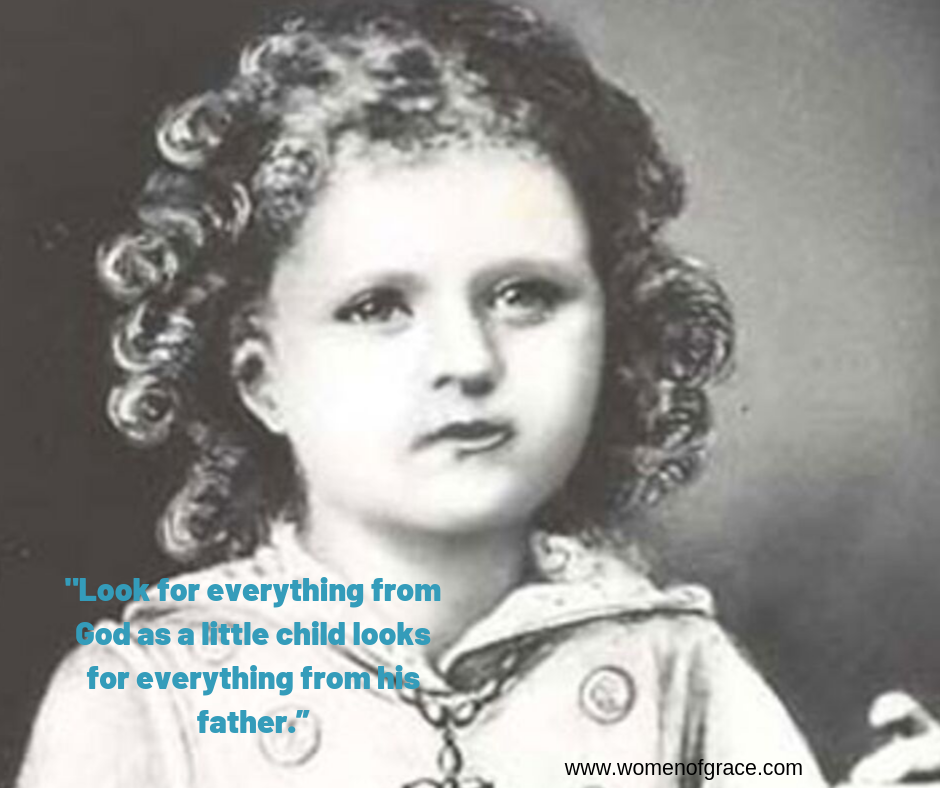 We all long for peace of soul, the kind of supernatural joy that can remain steadfast and robust even in the midst of the trials and anxieties of 21st century life. How can weak little souls achieve such a lofty goal? Simple! Look to the Little Flower of Lisieux who pioneered a path to this coveted peace that is specifically designed to fit the needs of “little souls” like us.
We all long for peace of soul, the kind of supernatural joy that can remain steadfast and robust even in the midst of the trials and anxieties of 21st century life. How can weak little souls achieve such a lofty goal? Simple! Look to the Little Flower of Lisieux who pioneered a path to this coveted peace that is specifically designed to fit the needs of “little souls” like us.When she died at the tender age of 24 on September 30, 1897, St. Therese left behind a beloved autobiography that spells out a path to Christian perfection which is particularly well-suited to those she affectionately referred to as des tout-petits or “the very little ones.”
Like her mentor, St. John of the Cross, she teaches the same need for the primacy of love in our relationship with God, the necessity of acquiring the kind of confidence founded upon the virtue of hope that makes blind faith possible, but she does so without the severity and complexities characteristic of St. John and other great saints.
Instead, “She is a young teacher who sits down near us to tell us her experiences. She is only a little doctor with notions so simple they seem poor,” writes P. Marie-Eugene, OCD, in I Am A Daughter of the Church.
 Simple indeed! Her Little Way has only one requirement: “to remain as a little child before God.”
Simple indeed! Her Little Way has only one requirement: “to remain as a little child before God.”
At first glance, it might sound almost too simple, but deeper reflection reveals the brilliance of this clever little strategy.
No matter what anxiety we face in life, from facing the unexpected loss of our job or our health to struggling to pay the bills and keep up with a frantic schedule, if we do so from a foundation of trust in a loving God who will take care of us no matter what happens – we will know that peculiar inner peace that can only come from a soul at rest.
But this can be challenging for most of us who live in a world where independence and self-sufficiency are revered, and dependence is seen as a weakness. This may be true in the natural realm, but there is a whole different set of rules in the spiritual realm.
As Father Marie-Eugene writes, “ . . . [T]o be reborn is nothing else than progressively to become a child. While in the material order generation, realized in the womb of the mother, comes to its perfection in a progressive separation of the child until it can live its perfect and independent life, a spiritual generation comes about inversely by a progressive absorption into unity.”
In other words, in the physical life a man grows larger and stronger and more self-reliant as he matures but in the spiritual life, maturation occurs by growing smaller, weaker, and more reliant on God.
Once we realize this, and can accept this basic fact about the spiritual life, we can let ourselves succumb to the most basic teaching of the Little Way, which is to “get little.” Instead of feeling ashamed of our weaknesses, of struggling to perfect ourselves with the hopes that God will bless us if we just “do better next time,” we follow Therese’s advice to simply “recognize our nothingness” and look for everything from God as a little child looks for everything from his father.
If we do this, she reassures, we will “be disquieted about nothing . . .”
 Yes, it’s really that simple. This is because “our nothingness” is exactly what attracts God to the soul. “The lower we are, the more we attract God,” she reminds.
Yes, it’s really that simple. This is because “our nothingness” is exactly what attracts God to the soul. “The lower we are, the more we attract God,” she reminds.
"If I am humble, I am entitled, without offending the good Lord, to do small foolish things until I die. Look at little children. They constantly break things, tear them up, fall, and all the while, in spite of that, they love their parents very much. Well, when I fall in this way, like a child, it makes me realize my nothingness and my weakness all the better and I say to myself: ‘What would become of me? What would I be able to accomplish if I were to rely on my own powers alone?’"
Just for clarification, it’s important to note that Therese is not saying that we should become complacent in our weakness because it draws God to us. Like little children who love their parents too much to stop wanting to please them, little souls feel the same way about God. They are people of good will who earnestly want to please Him, and usually fail out of weakness, not from being lukewarm. They know that without His help, they can do nothing – and they’re okay with that.
At the same time, just as the child knows that their parent wants to help them, the little soul also knows this and is content to “look for everything from God as a little child looks for everything from his father.”
As weak and incapable as the soul might be, this trusting attitude of heart lends it the courage of far greater souls because it is founded upon pure confidence in God and the knowledge that He truly wants to share His power with them.
This attitude enables even the tiniest soul to understand what God meant when He told St. Paul, “My power is made perfect in weakness” (2 Cor 12:9).
No one understood this better than Therese! “Since I have nothing, I shall receive everything from the good God” she once said with her characteristic boldness.
Even while living in an era when Jansenism and its focus on the stern justice of God ruled the Catholic world, Therese understood that God’s nature is one of Goodness, Truth, and Charity, which means that all of His justice is meted out in accordance with this nature.
This is why St. Augustine once said, “It is easier for God to hold back anger than mercy.”
Once we come to understand all this – that we can be weak and fail and yet still reach out in good will to God and receive the help we need, it changes everything. We’re no longer weighed down by shame over our weaknesses and the anxiety caused by realizing that we just can’t seem to overcome them.
Instead, these feelings are replaced by a new sense of trust in God and peace with oneself that naturally leads to the abandonment that is the culmination of the Little Way. And when we abandon ourselves to Him in our spiritual life, it’s only natural that we will abandon ourselves to Him in our secular life as well. This is because true peace cannot come about as a result of a meditation technique or self-help book. True peace can only come from a soul at rest in the arms of its God. Only then can we achieve the peace of soul we all long for – that firm and steady disposition that enables us to be like children who are “disquieted by nothing.”
Thanks to the Little Flower of Lisieux and her great love for little souls, the path to authentic peace of soul will remain eternally simple and within our reach.
